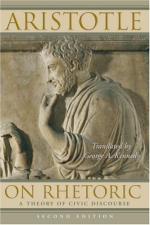
|
| Name: _________________________ | Period: ___________________ |
This quiz consists of 5 multiple choice and 5 short answer questions through Book III, Chapter 10-12.
Multiple Choice Questions
1. As explained by Aristotle in Book III, Chapter 10, how should effective prose express its important points?
(a) With succinct, extravagant sayings.
(b) With elegant, extravagant sayings.
(c) With succinct, elegant sayings.
(d) With succinct, extravagant, elegant sayings.
2. How did Aristotle describe the difference between spoken and written prose?
(a) Spoken prose was generally more stylized and complicated.
(b) Written prose was generally more stylized and complicated.
(c) Spoken prose was generally more stylized and less complicated.
(d) Written prose was generally more stylized and less complicated.
3. What explanation of justice did Aristotle provide?
(a) A well intentioned action.
(b) A well intentioned set of actions.
(c) A mean between two extremes.
(d) A means between three extremes.
4. According to Aristotle, what was the most basic cause of pleasure?
(a) Some kind of action in accordance with one's nature.
(b) Some kind of action in accordance with one's instincts.
(c) Some kind of action in accordance with one's desires.
(d) Some kind of action in accordance with one's abilities.
5. What was another word used for "legal" in Aristotle's discussion of legal rhetoric?
(a) Civil.
(b) Forensic.
(c) Political.
(d) Lawful.
Short Answer Questions
1. What was the difference between rhetoric and dialectic in the logical appeal?
2. Why did Aristotle think the universal law was higher than the special law?
3. Besides proof with explicit premises, what was included in Aristotle's definition of syllogism?
4. As discussed in Book III, Chapter 12, what should legal rhetoric blend argumentation with?
5. What did Aristotle say was the chief concern of political rhetoric?
|
This section contains 294 words (approx. 1 page at 300 words per page) |

|




